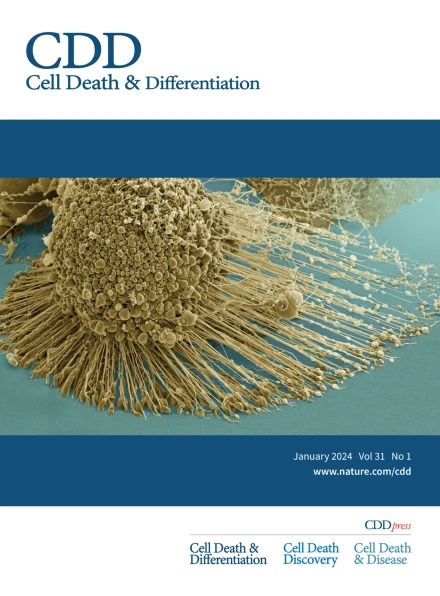Deacetylation of ANXA2 by SIRT2 desensitizes hepatocellular carcinoma cells to donafenib via promoting protective autophagy
IF 15.4
1区 生物学
Q1 BIOCHEMISTRY & MOLECULAR BIOLOGY
引用次数: 0
Abstract
Hepatocellular carcinoma (HCC) is one of the most lethal forms of cancer globally. HCC cells frequently undergo macroautophagy, also known as autophagy, which can lead to tumor progression and chemotherapy resistance. Annexin A2 (ANXA2) has been identified as a potential therapeutic target in HCC and is involved in the regulation of autophagic process. Here, we for the first time showed that ANXA2 deacetylation plays a crucial role in donafenib-induced autophagy. Mechanistically, donafenib increased SIRT2 activity via triggering both SIRT2 dephosphorylation and deacetylation by respectively downregulating cyclin E/CDK and p300. Moreover, elevation of SIRT2 activity by donafenib caused ANXA2 deacetylation at K81/K206 sites, leading to a reduction of the binding between ANXA2 and mTOR, which resulted in a decrease of mTOR phosphorylation and activity, and ultimately promoted protective autophagy and donafenib insensitivity in HCC cells. Additionally, ANXA2 deacetylation at K81/K206 sites was positively correlated with poor prognosis in HCC patients. Meanwhile, we found that selective inhibition of SIRT2 increased the sensitivity of donafenib in HCC cells by strengthening ANXA2 acetylation. In summary, this study reveals that donafenib induces protective autophagy and decreases its sensitivity in HCC cells through enhancing SIRT2-mediated ANXA2 deacetylation, which suggest that targeting ANXA2 acetylation/deacetylation may be a promising strategy for improving the sensitivity of donafenib in HCC treatment.


SIRT2对ANXA2的去乙酰化通过促进保护性自噬使肝癌细胞对多那非尼脱敏
肝细胞癌(HCC)是全球最致命的癌症之一。HCC细胞经常发生巨噬,也称为自噬,可导致肿瘤进展和化疗耐药。膜联蛋白A2 (ANXA2)已被确定为HCC的潜在治疗靶点,并参与自噬过程的调节。在这里,我们首次发现ANXA2去乙酰化在多纳非尼诱导的自噬中起着至关重要的作用。从机制上讲,donafenib通过下调cyclin E/CDK和p300分别触发SIRT2去磷酸化和去乙酰化,从而增加SIRT2活性。此外,多纳非尼升高SIRT2活性导致ANXA2在K81/K206位点去乙酰化,导致ANXA2与mTOR结合减少,从而导致mTOR磷酸化和活性降低,最终促进HCC细胞的保护性自噬和多纳非尼不敏感。此外,K81/K206位点的ANXA2去乙酰化与HCC患者的不良预后呈正相关。同时,我们发现选择性抑制SIRT2通过增强ANXA2乙酰化,增加了多纳非尼在HCC细胞中的敏感性。综上所述,本研究揭示了多纳非尼通过增强sirt2介导的ANXA2去乙酰化诱导HCC细胞保护性自噬并降低其敏感性,提示靶向ANXA2乙酰化/去乙酰化可能是提高多纳非尼治疗HCC敏感性的一种有希望的策略。
本文章由计算机程序翻译,如有差异,请以英文原文为准。
求助全文
约1分钟内获得全文
求助全文
来源期刊

Cell Death and Differentiation
生物-生化与分子生物学
CiteScore
24.70
自引率
1.60%
发文量
181
审稿时长
3 months
期刊介绍:
Mission, vision and values of Cell Death & Differentiation:
To devote itself to scientific excellence in the field of cell biology, molecular biology, and biochemistry of cell death and disease.
To provide a unified forum for scientists and clinical researchers
It is committed to the rapid publication of high quality original papers relating to these subjects, together with topical, usually solicited, reviews, meeting reports, editorial correspondence and occasional commentaries on controversial and scientifically informative issues.
 求助内容:
求助内容: 应助结果提醒方式:
应助结果提醒方式:


